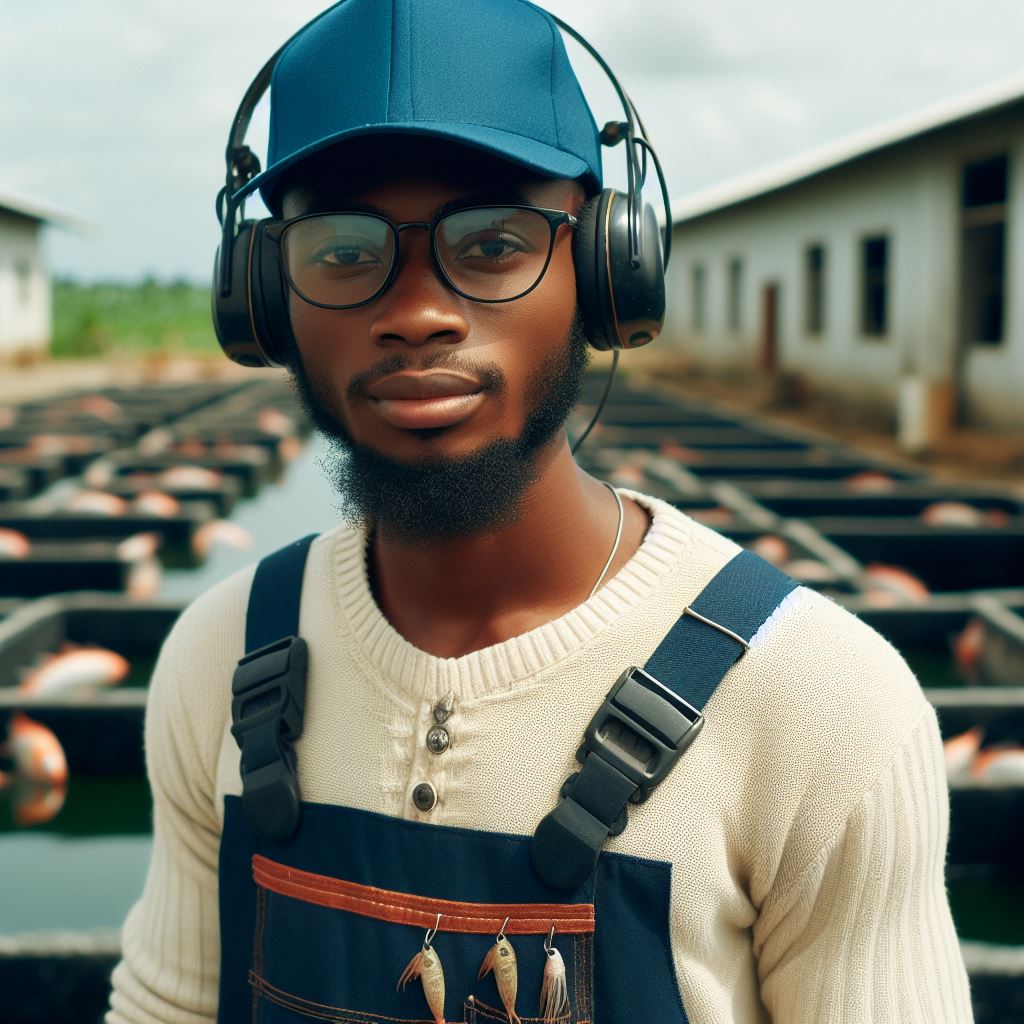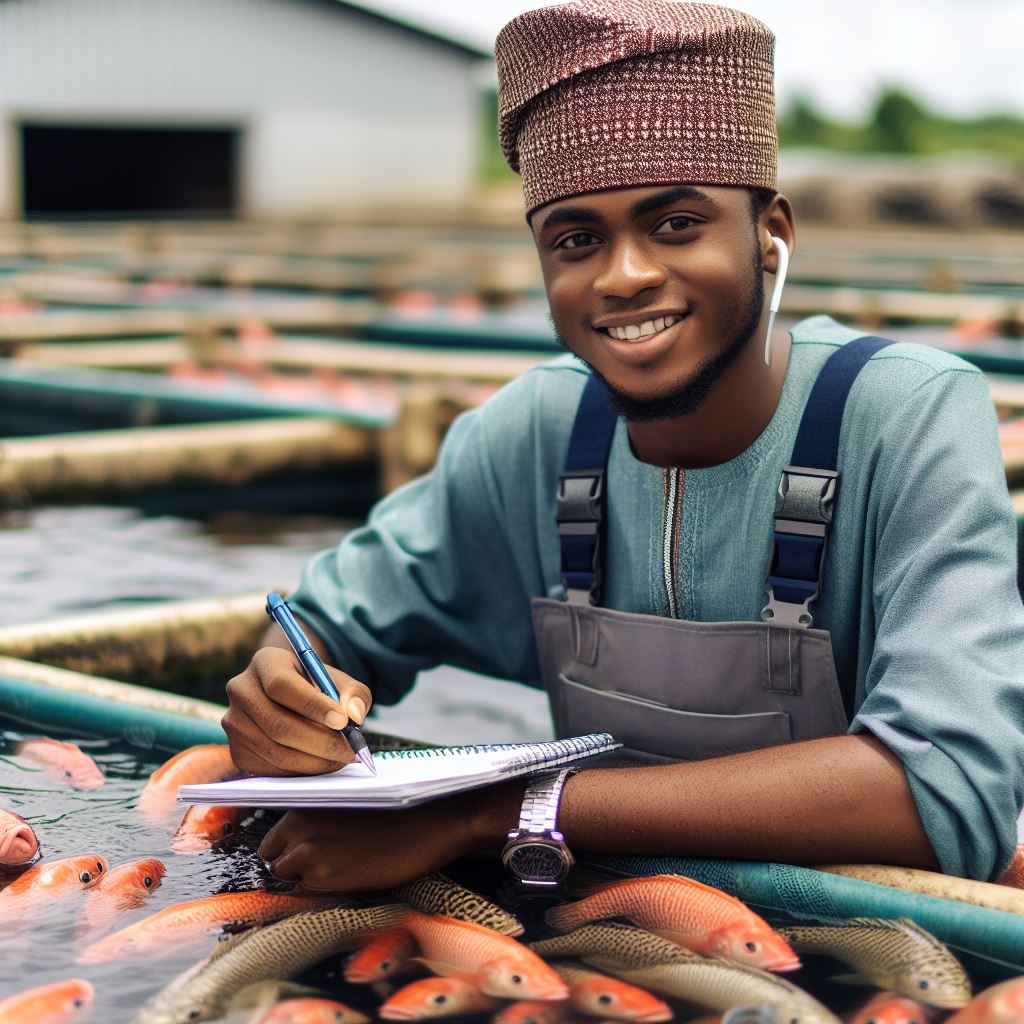Introduction
Aquaculture is the practice of breeding, rearing, and harvesting aquatic organisms in controlled environments.
It plays a vital role in meeting the increasing demand for fish and seafood products worldwide.
In Nigeria, aquaculture is of great importance to the economy.
It provides employment opportunities, improves food security, and contributes to the country’s GDP.
Nigeria has a vast potential for aquaculture due to its abundant water resources.
The purpose of this blog post is to provide a university perspective on the modern trends in Nigerian aquaculture.
Through research and innovation, universities play a crucial role in developing sustainable aquaculture practices and improving productivity.
By examining the current trends in Nigerian aquaculture, we aim to shed light on the advancements made in the industry and the challenges that need to be addressed.
This blog post will explore the various research areas universities are focusing on to support the growth and development of aquaculture in Nigeria.
Through this university perspective, we hope to promote knowledge sharing and collaboration between academia and industry.
By working together, we can overcome barriers and maximize the potential of aquaculture in Nigeria, ensuring a sustainable and lucrative sector for the future.
Overview of Aquaculture in Nigeria
Aquaculture and its significance in Nigeria
Aquaculture refers to the cultivation of aquatic organisms in controlled environments, such as ponds or tanks.
In Nigeria, it plays a crucial role in meeting the increasing demand for fish products.
Statistics on the current state of aquaculture in the country
According to the Nigerian Institute for Oceanography and Marine Research, aquaculture production in Nigeria has been growing steadily over the years.
In 2020, the country produced approximately 284,000 metric tons of fish through aquaculture.
Challenges faced by the aquaculture industry in Nigeria
Despite its growth, the aquaculture industry in Nigeria faces several challenges.
One of the key issues is the lack of access to quality fish feeds, which affects fish growth and overall productivity.
Another challenge is the inadequate infrastructure, such as good road networks and storage facilities, which hampers the transportation and preservation of fish products.
Moreover, the high cost of production inputs, including feed, fingerlings, and equipment, poses a significant challenge for aquaculture farmers, especially those operating on a small scale.
Additionally, the issue of water pollution and inadequate water supply affects fish health and production.
Pollution from industrial activities, agricultural practices, and improper waste management can harm fish populations and contribute to disease outbreaks.
Furthermore, the lack of technical knowledge and skills among farmers limits the adoption of modern technologies and best practices in aquaculture.
Lastly, the sector faces regulatory and policy challenges, such as inconsistent government policies and the absence of an effective regulatory framework.
This leads to confusion, lack of coordination, and difficulty in accessing necessary permits and licenses.
Overcoming these challenges
To overcome these challenges, there is a need for increased investment in aquaculture infrastructure and research and development.
Government support in the form of subsidies and loans can help reduce the cost of inputs for farmers.
Furthermore, capacity-building programs and training initiatives should be provided to farmers to enhance their technical skills and knowledge.
Collaboration between universities and industry players can facilitate the exchange of expertise and promote innovation in the sector.
Addressing water pollution requires a holistic approach, involving stringent regulations on waste management practices and continuous monitoring of water quality.
Lastly, a well-defined regulatory framework and consistent government policies will create a conducive environment for growth and attract more investment into the aquaculture sector.
In essence, aquaculture plays a significant role in Nigeria’s food security and economic development.
However, challenges such as access to quality fish feeds, inadequate infrastructure, high production costs, water pollution, lack of technical knowledge, and regulatory issues hinder its full potential.
Addressing these challenges through investment, capacity-building, and effective regulations will contribute to the sustainable growth of the aquaculture industry in Nigeria.
Read: Modern Technologies Enhancing Crop Protection in Nigerian Agriculture
Traditional Aquaculture Practices in Nigeria
Historical and cultural aspects of traditional aquaculture methods
Traditional aquaculture in Nigeria has been practiced for centuries, deeply rooted in cultural traditions.
Indigenous communities relied on natural water bodies such as lakes, rivers, and swamps for fish production.
The historical aspect of traditional aquaculture showcases its importance in sustaining local livelihoods.
Communities developed specific knowledge and skills related to fish farming, passed down through generations.
Traditional aquaculture methods have cultural significance, often integrated with religious and social ceremonies.
Main traditional practices employed in Nigerian aquaculture
Pond culture is a widely practiced traditional method, where fish are reared in man-made ponds.
Transform Your Career with Expert Guidance
Get personalized mentorship consulting that’s tailored to your unique path. Our expert advice is actionable and exclusive.
Get StartedCage culture involves confining fish in cages or enclosures placed in natural water bodies.
Integrated fish farming incorporates fish production with agriculture, such as combining fish and vegetable farming.
Rice-fish farming is another traditional practice where fish are grown alongside rice crops in paddy fields.
Strengths and weaknesses of these traditional methods
The main strength of traditional aquaculture practices is their adaptability to local conditions and resources.
These methods are cost-effective, utilizing locally available materials and requiring minimal infrastructure.
Traditional practices contribute to food security, providing a source of affordable protein for communities.
They also have a relatively low environmental impact compared to intensive modern aquaculture systems.
However, traditional methods often lack scientific principles and proper management techniques.
Productivity and production levels may be lower than modern aquaculture systems, limiting economic viability.
Disease control and prevention measures may be inadequate, leading to health issues in fish stocks.
In fact, traditional aquaculture practices in Nigeria have a rich historical and cultural significance.
These methods have sustained communities for generations and showcase the adaptability of local resources.
While they have strengths such as cost-effectiveness and low environmental impact, they also have weaknesses regarding productivity and disease management.
As the aquaculture industry evolves, it becomes essential to integrate traditional knowledge with modern scientific advancements for sustainable and profitable fish production.
Read: Career Prospects After Studying Fisheries in Nigerian Universities
Introduction to Modern Trends in Nigerian Aquaculture
The Need for Innovation and Modernization in the Aquaculture Sector
- The aquaculture sector in Nigeria is in need of innovation and modernization.
- This is due to the growing demand for fish and the limited supply from traditional fishing methods.
- In order to meet the increasing demand for fish, new and efficient techniques are required.
- Innovation and modernization can help increase production, improve quality, and ensure sustainable practices.
- It is crucial to invest in new technologies and methods to ensure the long-term viability of the aquaculture sector.
The Role of Universities in Driving Technological Advancements
- Universities play a vital role in driving technological advancements in Nigerian aquaculture.
- They are at the forefront of research and development, exploring new techniques and technologies.
- Universities collaborate with industry stakeholders to identify challenges and develop innovative solutions.
- Through research and training programs, universities equip aquaculture professionals with the knowledge and skills to adopt modern trends.
- The expertise and resources available at universities enable the sector to progress and thrive.
Introduction to Various Modern Trends in Nigerian Aquaculture
- Several modern trends have emerged in Nigerian aquaculture, revolutionizing the industry.
- One such trend is the use of recirculating aquaculture systems (RAS) for fish production.
- RAS systems optimize water usage, minimize waste, and provide a controlled environment for fish growth.
- Another trend is the adoption of improved fish breeding techniques, such as selective breeding and genetic manipulation.
- These techniques enhance fish performance, yield, and resistance to diseases.
- Additionally, the use of advanced feeding techniques and formulated diets has become widespread.
- These diets are tailored to the nutritional needs of different fish species, promoting optimal growth.
- Aquaponics, a system that integrates aquaculture with hydroponics, is also gaining popularity.
- Aquaponics systems use fish waste as nutrients for growing plants, creating a symbiotic relationship.
- This trend provides a sustainable approach to fish and vegetable production.
Furthermore, the application of biotechnology in aquaculture has led to the development of disease-resistant fish strains.
Biotechnology plays a significant role in disease management and enhances the overall productivity of the sector.
The use of remote monitoring and data analysis has also emerged as a modern trend in Nigerian aquaculture.
These technologies enable real-time monitoring of water quality, fish behavior, and production parameters.
By analyzing the collected data, farmers can make informed decisions and optimize production efficiency.
Finally, the application of artificial intelligence and machine learning in aquaculture is an exciting trend.
These technologies can predict fish growth, optimize feeding regimes, and automate various processes.
By harnessing the power of artificial intelligence, aquaculture becomes more efficient and sustainable.
In short, Nigerian aquaculture is experiencing a shift towards modernization and innovation.
The need for increased production and sustainability has driven the adoption of various modern trends.
Universities play a crucial role in driving these advancements through research, collaboration, and training.
From recirculating aquaculture systems to artificial intelligence, these trends are transforming the sector and ensuring its long-term viability.
Read: Top Nigerian Universities Offering Crop & Environmental Protection

Technological Advances in Nigerian Aquaculture
The use of advanced technology in fish farming systems
- The use of advanced technology in Nigerian aquaculture has revolutionized fish farming practices.
- Technologies such as automated feeding systems and water quality monitoring devices have improved production efficiency.
- Advanced technology allows for better control over environmental conditions, leading to optimal growth and higher yields.
- The adoption of advanced fish farming systems has helped Nigerian farmers meet the increasing demand for fish.
- Remote monitoring systems have made it easier for farmers to manage their farms and track performance without physical presence.
Benefits and challenges of employing technology in aquaculture
- The use of technology in aquaculture brings several benefits, including increased productivity and profitability.
- Advanced systems enable farmers to optimize resource utilization by providing precise control over feed and water management.
- Efficient use of resources reduces the environmental impact of aquaculture and promotes sustainability.
- However, the adoption of technology also presents challenges such as high initial investments and technical skill requirements.
- Limited access to reliable electricity and internet connectivity in remote areas can hinder the uptake of advanced technology in aquaculture.
Specific innovations and technologies being adopted by Nigerian universities
- Nigerian universities have been at the forefront of developing and implementing innovative technologies in aquaculture.
- Introduction of recirculating aquaculture systems (RAS) in university farms has improved water management and reduced environmental impact.
- RFID (Radio Frequency Identification) technology is being used to monitor fish movement, behavior, and growth in research projects.
- Universities are exploring the use of drones and satellite imagery for mapping and monitoring aquaculture ponds.
- Collaborative research efforts with industry partners have allowed universities to develop customized aquaculture software solutions.
- Technologies like artificial intelligence and machine learning are being applied to predict fish health and optimize feeding strategies.
Technological advances in Nigerian aquaculture have opened up new possibilities for fish farming.
While there are challenges to overcome, the benefits of employing advanced technology are undeniable.
Nigerian universities are actively embracing and promoting technological innovations in aquaculture.
These advancements have the potential to transform the industry and contribute to Nigeria’s food security and economic growth.
Continued research and collaboration between universities and industry stakeholders will further drive technological progress in Nigerian aquaculture.
Read: From Field to Classroom: Real-life Crop Protection Stories in Nigeria
Sustainability and Environmental Considerations
Importance of sustainable aquaculture practices
Aquaculture must prioritize sustainable practices to ensure the long-term viability of the industry.
Environmental stewardship and responsible management are essential for sustainable aquaculture.
Sustainable practices minimize negative impacts and allow for the preservation of aquatic ecosystems.
By adopting sustainable practices, the aquaculture industry can meet the growing demands for fish while safeguarding the environment.
Impact of aquaculture on the environment and ecosystems
Aquaculture, if not practiced sustainably, can have detrimental effects on the environment and ecosystems.
Intensive fish farming can lead to water pollution, habitat destruction, and genetic contamination.
Excessive use of antibiotics and chemicals in aquaculture can harm aquatic organisms and contaminate water bodies.
Understanding and mitigating these impacts are crucial for the future of aquaculture.
Initiatives and research conducted by universities to mitigate environmental concerns
University-led research plays a vital role in finding solutions to environmental challenges in aquaculture.
Researchers are developing innovative techniques to reduce waste and promote recycling in fish production systems.
Universities are exploring alternatives to fishmeal and fish oil to ensure sustainable feed sources in aquaculture.
Efforts are being made to enhance water treatment and minimize the release of harmful substances into ecosystems.
Through collaboration with industry and government agencies, universities aim to develop sustainable aquaculture practices.
Research projects focus on optimizing nutrient management to minimize water pollution and eutrophication.
Universities are studying the impacts of aquaculture on native species to prevent ecological disruptions.
Researchers are working on breeding programs to develop fish species that are resilient to environmental changes.
Initiatives are underway to promote the restoration of coastal habitats affected by aquaculture activities.
Universities conduct studies to assess the economic viability of sustainable aquaculture practices.
Economic analyses help identify strategies that balance profitability with environmental protection.
Research findings contribute to the development of best management practices and policy recommendations.
Universities also play a crucial role in educating future aquaculture professionals about sustainability practices.
In general, sustainable aquaculture practices are of paramount importance in ensuring the long-term success of the industry.
While aquaculture offers immense potential, its impact on the environment and ecosystems cannot be neglected.
By emphasizing sustainability and conducting research, universities are actively mitigating environmental concerns.
Collaboration between academia, industry, and government is crucial to achieve sustainable aquaculture for future generations.
Find Out More: Importance of Wildlife Management to Nigerian Economy
Discover More: Top Seed Companies in Nigeria and Their Contributions
Explore Further: Success Stories: Nigerian Pasture Management Professionals
Find Out More: Effective Disease Control in Nigerian Livestock
Economic Impact and Market Opportunities
Economic impact of modern trends in Nigerian aquaculture
Modern trends in Nigerian aquaculture have had a significant economic impact on the country.
With the adoption of advanced farming techniques and technologies, the aquaculture sector has experienced growth and increased productivity.
These advancements have led to higher fish production, which in turn has boosted employment opportunities and income generation for local communities.
The increase in production has also created a ripple effect on other sectors of the economy, such as the transportation and packaging industries.
Market opportunities and potential for growth in the sector
The market opportunities in the Nigerian aquaculture sector are vast.
As the country continues to face challenges in meeting its fish demand through traditional fishing methods, there is a growing need for alternative sources of fish, such as aquaculture.
As the population continues to grow, the demand for fish is expected to rise significantly.
This presents ample opportunities for investment and growth in the sector.
With the right policies and support, Nigeria can become a major player in the global aquaculture market.
University research and initiatives aimed at enhancing market opportunities
Nigerian universities have taken an active role in conducting research and implementing initiatives aimed at enhancing market opportunities in the aquaculture sector.
For example, the University of Lagos has established a fish farm that serves as a training center for students and farmers.
This initiative not only provides practical training but also serves as a demonstration farm for showcasing modern aquaculture practices.
The University of Abuja has also been actively involved in research related to fish nutrition and feed development.
Their findings have contributed to the improvement of fish health and growth, thereby increasing the market value of locally produced fish.
Furthermore, universities across Nigeria are collaborating with industry players and government agencies to develop entrepreneurship programs that promote aquaculture as a viable business opportunity.
These programs provide funding and mentorship to aspiring fish farmers, fostering innovation and growth in the sector.
In a nutshell, the modern trends in Nigerian aquaculture have had a positive economic impact, creating job opportunities and driving growth in various industries.
The market opportunities are vast, and with the support of research and initiatives from universities, Nigeria can further enhance its position in the global aquaculture market.
Uncover the Details: Wildlife Management Education Programs in Nigeria
Uncover the Details: Role of Biotechnology in Nigerian Livestock Farming
Conclusion
In this blog post, we discussed the modern trends in Nigerian aquaculture.
It is crucial to emphasize the role of universities in shaping these trends.
Universities play a significant role in research, innovation, and producing skilled professionals for the aquaculture industry.
Through collaborations with farmers and industry experts, universities facilitate the development of sustainable aquaculture practices.
Some key points discussed include the adoption of advanced technologies, such as recirculating aquaculture systems and genetic improvement.
We also explored the importance of diversification in aquaculture species to meet market demands and reduce reliance on imports.
Furthermore, the need for value addition, marketing strategies, and entrepreneurship in the aquaculture sector was highlighted.
Universities provide the necessary platform for conducting scientific research, finding solutions to challenges, and promoting knowledge transfer.
By offering specialized courses and training programs, universities equip individuals with the skills needed to excel in a dynamic aquaculture industry.
The future of aquaculture in Nigeria looks promising, thanks to the active involvement of universities.
With their continued dedication to research and education, universities will play a crucial role in further shaping modern trends in Nigerian aquaculture.
The development of innovative practices, improved production methods, and sustainable approaches will ensure the growth and profitability of the aquaculture industry in Nigeria.
As challenges arise, universities will be at the forefront, working towards finding solutions and guiding the industry towards success.
Overall, there is much optimism for the future of aquaculture in Nigeria, and universities will remain key players in driving its progress.




